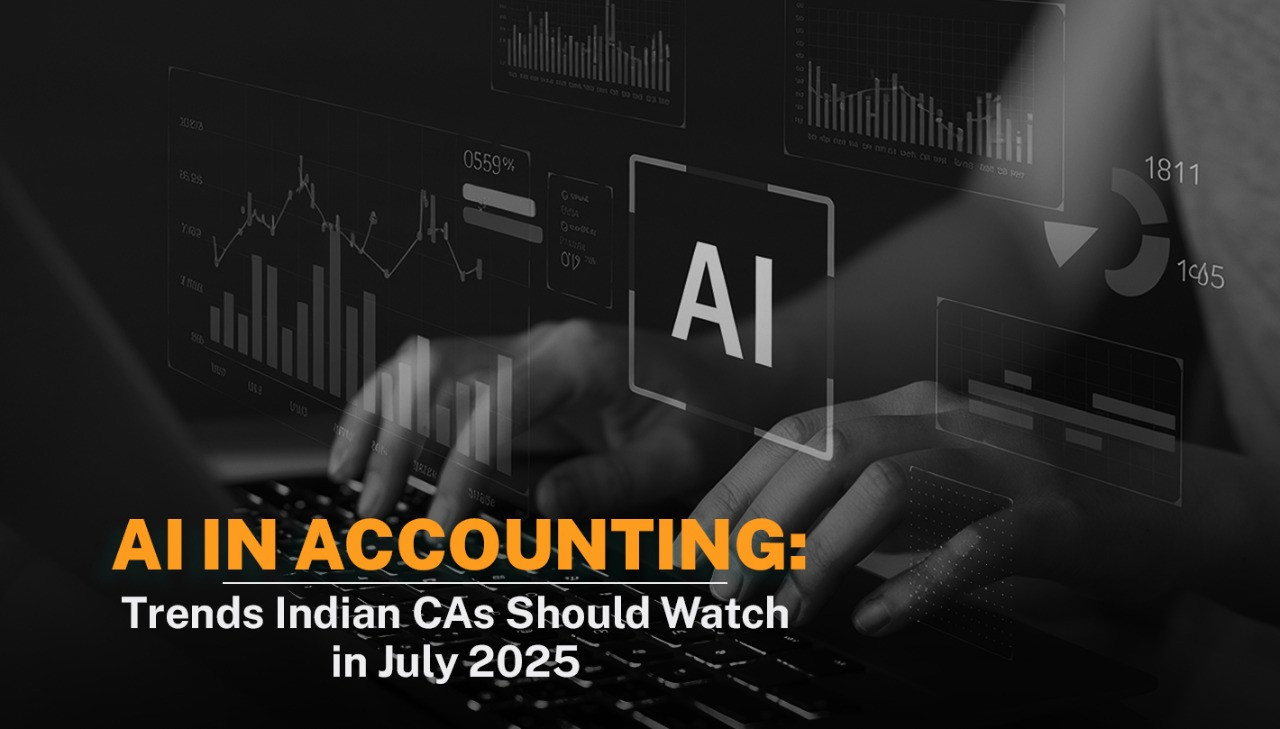


Artificial Intelligence (AI) is no longer just a buzzword. It’s reshaping the way industries function- including accounting. As India’s digital economy matures, AI is increasingly being integrated into everyday accounting tasks, audits, taxation, and advisory roles. For Chartered Accountants (CAs), this evolution is not about replacement but about adaptation.
In July 2025, several key trends are emerging that are particularly relevant for Indian CAs. Understanding and keeping pace with these changes is vital—not just for professional growth, but also to ensure that businesses and stakeholders are served effectively in this tech-driven environment.
1. Automated Bookkeeping Is The New Normal
AI-powered bookkeeping tools are capable of scanning invoices, categorising expenses, matching entries, and reconciling bank statements with minimal human input. For many MSMEs and startups, this has become the default accounting system.
While automation handles routine tasks, CAs are increasingly focusing on review, interpretation, and exception handling. This shift allows for more time to be spent on judgment-based and strategic aspects of financial management.
2. AI-Driven Insights for Financial Planning
AI tools now offer predictive analytics based on historical data, market patterns, and behavioural trends. These tools can forecast cash flows, suggest budgeting strategies, and flag inconsistencies before they turn into risks.
For CAs, this means their role is expanding from recording transactions to interpreting AI-generated insights. The ability to validate, question, and apply those insights in context is becoming a critical skill.
3. Tax Compliance Is Becoming More Real-Time
With the increasing digitalisation of India's tax system through AIS, e-invoicing, and real-time GST reconciliation, AI is helping streamline tax filings and compliance. Several platforms now offer AI-powered validation tools that pre-check returns, ensure input-output matching, and reduce the chances of human error.
For CAs, this technology is a powerful ally. While the responsibility and review remain human-led, the process becomes more efficient, allowing more time for advisory and dispute resolution, where required.
4. Generative AI for Drafting and Documentation
Generative AI is being used to draft financial statements, board meeting minutes, audit reports, and responses to notices—using predefined templates and firm-specific logic. While human oversight is non-negotiable, this trend saves significant time on first drafts and documentation structure.
CAs who understand how to guide such tools with accurate prompts and review outputs thoroughly are already seeing efficiency gains.
5. AI in Audit and Forensic Services
AI-enabled tools can scan large volumes of financial data to identify anomalies, detect patterns of fraud, and assess risk in real time. Whether it’s unusual ledger behaviour, round-tripping of transactions, or policy violations, these tools enhance the auditor’s ability to focus on the right areas.
While professional judgement remains to be the CA’s domain, AI enhances precision and supports deeper audits—especially in high-volume environments.
6. Ethics, Accountability, and Human Oversight
Even as AI tools evolve, the professional responsibility of a Chartered Accountant cannot be delegated. Decisions based on financial data, compliance strategy, or legal interpretation require experience and ethical judgment.
The ICAI continues to reinforce the importance of ethics and accountability. CAs must understand how AI systems arrive at their conclusions and remain responsible for validating and reviewing any output that influences financial reporting or taxation.
7. The Learning Curve and Professional Development
Keeping up with AI trends doesn’t necessarily mean becoming a coder. But it does involve understanding how these tools work, how to interpret results, and how to use them to make better decisions. Several CPE modules and certifications in data analytics, forensic accounting, and AI in finance are already available through the ICAI and global institutions.
CAs who embrace lifelong learning and digital adaptability are positioning themselves to remain relevant in an AI-augmented economy.
Conclusion:
AI is transforming accounting workflows across India, but the role of a Chartered Accountant remains vital. With their understanding of financial systems, regulatory frameworks, and professional ethics, CAs are uniquely positioned to guide, validate, and interpret AI-powered outputs.
The future isn't about AI replacing accountants—it’s about how well accountants can collaborate with intelligent tools to deliver greater value, transparency, and trust. As we step into the second half of 2025, a proactive, adaptive, and open-to-change mindset will continue to shape the future of accounting in India’s digital-first economy.